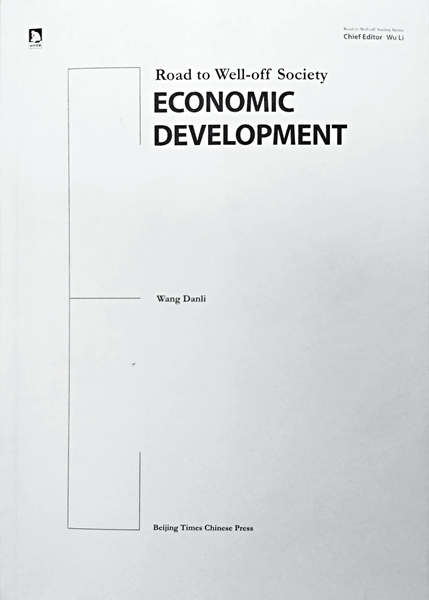By staff reporter ZHOU LIN

Road to Well-off Society: Economic Development
Author: Wang Danli
Price: RMB 135
Paperback, 190 pages
Published by Beijing Times Chinese Press
By staff reporter ZHOU LIN

Road to Well-off Society: Economic Development
Author: Wang Danli
Price: RMB 135
Paperback, 190 pages
Published by Beijing Times Chinese Press
TO complete the building of a moderately prosperous society in all respects by 2020 is a historical task established at the 18th National Congress of the Communist Party of China (CPC) in 2013. It is also a choice and a promise of the CPC based on its 64 years of ruling experience and 35 years of practical experience since China’s reform and opening-up.
“The people’s wish for a good life shows us the direction in which we endeavor.” This statement, by General Secretary of the CPC Central Committee Xi Jinping at the press conference after the first Plenary Session of the 18th CPC Central Committee, not only verifies the solemn promise of the state leader, but has also been proved in the course of history.
“A moderately prosperous society,” or “a well-off society,” reflects ancient Chinese philosophy, as it describes an ideal society in which the government is honest, enlightened, and its people live an affluent life. Therefore, this phrase expresses Chinese people’s pursuit of a prosperous life. And the Chinese nation has kept and pursued this dream for thousands of years.
The Road to Well-off Society Series, published by Beijing Times Chinese Press, expounds the road to a well-off society with Chinese characteristics. It clarifies the nature of the road and explains why the road is suitable for China’s national conditions. The book series fully displays China’s confidence in its development path, theories, and systems.
The series consists of six books, including a review of the economic, political, cultural, social, and ecological development in China. The author chooses several critical nodes in the process of building a well-off society, such as historical incidents, features, and phenomena, and combines all these representative materials together with vivid pictures and a story-telling style; making it easy for readers in and out of China to understand.
Chief editor of the series, Wu Li is vice president and researcher of the Institute of Contemporary China Studies under Chinese Academy of Social Sciences (CASS), as well as the doctoral supervisor of the CASS Graduate School. He has been engaged in the research of the history of the CPC and China’s modern economic history. This book review mainly focuses on China’s economic development. Its author Wang Danli is an associated research fellow of the CASS Institute of Contemporary China Studies.
The book constitutes eight chapters, giving a holistic review on the economic development since the founding of the People’s Republic of China. Looking back on China’s recent history, we may understand how the CPC has led Chinese people forward from a planned economy to a market economy, how it has constantly readjusted economic structure and transformed development modes, how it has opened up in an all-round manner to the outside world, and how it has improved the lives of urban and rural residents.
During the process of urban-rural integration, China encountered multiple challenges, for example, issues concerning agriculture, farmers, and rural areas. It therefore launched a campaign to build a new socialist countryside. To deal with the unbalanced development between western and eastern provinces, China coordinated the development of regional economies through, among other measures, the drive to galvanize growth in the less developed West China and to revitalize old industrial bases in Northeast China. Finally, the book looks at the challenges on the road of building a moderately prosperous society in all respects, predicting that it is an arduous task.
Realizing the Chinese Dream of the rejuvenation of the Chinese nation has been a long-cherished wish of the Chinese people since the advent of modern times. To help achieve this, Two Centenary Goals were put forth by the CPC at its 18th National Congress for building socialism with Chinese characteristics. The two goals are: to finish building a moderately prosperous society in all respects by the time the CPC celebrates its centenary in 2021; and to turn China into a modern socialist country that is prosperous, strong, democratic, culturally advanced, and harmonious by the time the People’s Republic of China celebrates its centenary in 2049.
China has now arrived at the decisive stage of realizing its first Centenary Goal. Our current efforts will determine whether that goal can be achieved on time, and to a large extent, the process of the second Centenary Goal. There is no doubt that China faces a major opportunity but also various challenges.
Reading through the book, readers can feel the pulse of history and understand the far-sighted vision and ruling wisdom of the CPC in different historical periods.
Chinese Ambassador to the U.S. Cui Tiankai told China Today during the “Two Sessions” (annual gathering of the National People’s Congress and the Chinese People’s Political Consultative Conference) earlier this year that he believed the primary and fundamental challenges to all nations of the world were ensuring good governance, the healthy development of its economy, the stability of its society, and the level of happiness of its people. “The Chinese government and its ruling party have always regarded the people’s well-being as the top priority, and have been working untiringly to achieve this goal,” Cui said.
The economy is a matter which concerns the livelihood of all citizens. Only on the basis of economic development and a life of abundance can people be happy and content and can a moderately prosperous society in all respects become reality. In this sense, the book is an authoritative research on contemporary China’s economic history that incorporates the macro and micro aspects of the Chinese economy and looks at their impacts on the average Chinese person.